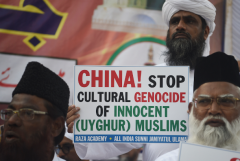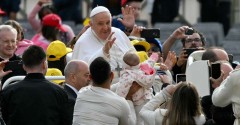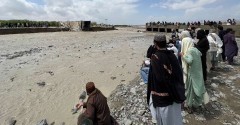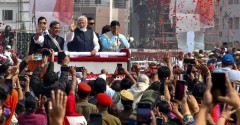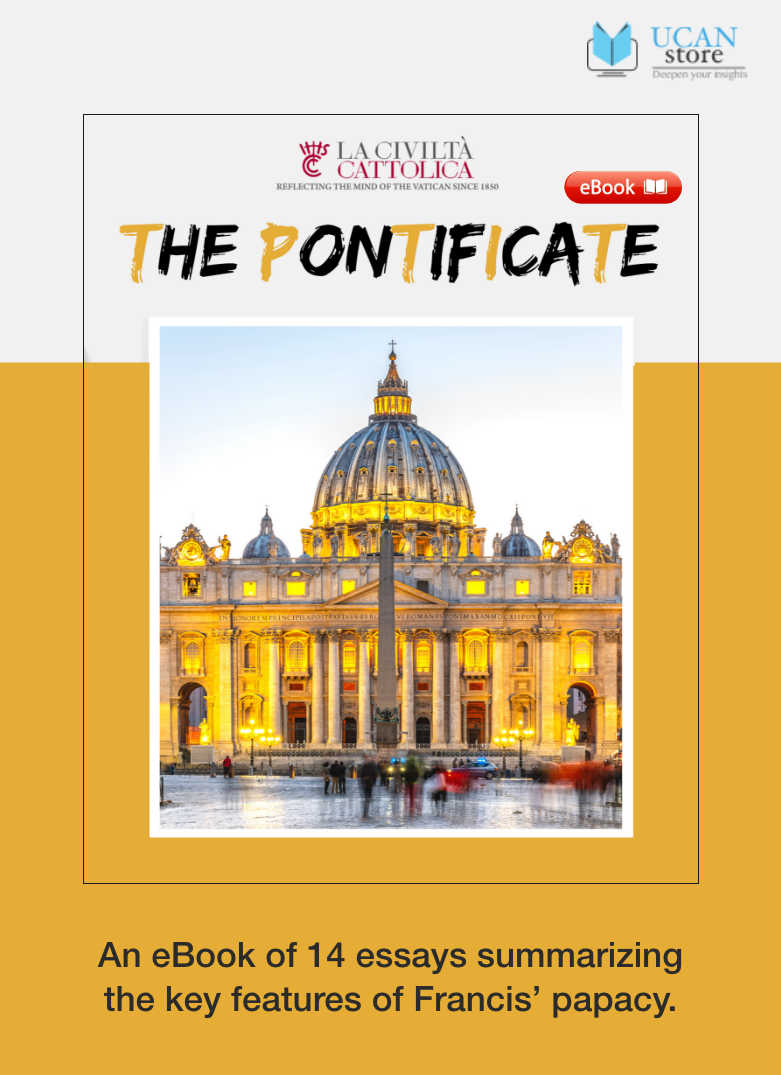
NEWSLETTERS
What’s happening in Asian Church
and what does it mean for the
rest of the world?
Updated: April 22, 2020 03:25 AM GMT

Martin Lee, the 'grandfather' of Hong Kong's democracy movement, was arrested along with 14 other prominent pro-democracy politicians and activists including fellow Catholics Jimmy Lai and Albert Ho. (Photo: YouTube)
"Thus we left Hong Kong to her fate and the hope that Martin Lee, the leader of the Democrats, would not be arrested,” wrote the Prince of Wales in his private journal after the handover of Hong Kong in 1997. I doubt whether he or anyone else thought that day would come quite so soon.
The decision to arrest one of Hong Kong’s most senior barristers and the “grandfather” of the city’s democracy movement, 81-year-old Lee, a Catholic, along with 14 other prominent pro-democracy politicians and activists including fellow Catholics Jimmy Lai, owner of the pro-democracy Apple Daily newspaper, and Albert Ho, a lawyer and former chairman of the Democratic Party, strikes at the very heart of whatever remains of Hong Kong’s liberties, the rule of law and autonomy — presumably hoping to exploit the fact that the world’s minds are concentrated on the coronavirus pandemic.
It is also, as Britain’s former foreign secretary Sir Malcolm Rifkind put it, an attack “on the international rules-based order itself” because it marks a betrayal of the promises made in Hong Kong’s mini-constitution and the Sino-British Joint Declaration, an international legal treaty lodged at the United Nations and valid until 2047.
It is not, of course, entirely out of the blue. Hong Kong’s freedoms and autonomy have been under ever-increasing pressure in the past six years as Beijing has tightened the screws. During that time we have seen the disappearance of anti-regime booksellers, the disqualification of pro-democracy legislators, pressure on academic and press freedom, a law criminalizing perceived insults to the national anthem, legislation applying Chinese law on Hong Kong soil at the high-speed rail terminus — leading to the arrest and imprisonment on the mainland of British consulate official Simon Cheng — the expulsion of a growing list of foreign activists and journalists including myself, and the arrest and imprisonment of peaceful protesters under the arcane Public Order Ordinance, which gives the police excessive powers to proscribe protests.
Over the past year, Hong Kong’s crisis has escalated to a dramatic level after its Chief Executive Carrie Lam proposed a law to allow the extradition from Hong Kong to mainland China of people the regime in Beijing accuses of criminal acts. That sparked sustained — and initially largely peaceful — mass protests, involving up to two million Hongkongers at their height. Some protesters became more violent in frustration at a government that refused to listen and a police force that responded to peaceful protest with rubber bullets, batons, pepper spray and tear gas. The cycle of violence escalated and, although the actions of violent demonstrators cannot be condoned, the indiscriminate, extreme, disproportionate brutality of the police, perpetrated with impunity, has left a scar on Hong Kong that runs deep.
There have been many opportunities to prevent Hong Kong’s descent into this crisis. At every turn Lam could have listened to the voices of protest from lawyers, businesses, legislators, the international community and two million peaceful marchers, but she failed to do so. Only when it was too late, when trust was completely broken, did she finally withdraw the extradition bill.
District council elections last November provided another opportunity for reconciliation. The pro-democracy camp won a significant victory, sending a clear signal about the will of the people. Lam could have responded by initiating a meaningful process of political reform in dialogue with the newly elected representatives of the people. Instead, listening with a tin ear, she gave jobs to defeated pro-Beijing candidates and ignored the voters’ message. As I wrote on this site last year, Lam — also a Catholic — has blood on her hands.
On New Year’s Eve, at the dawn of a new decade, 44 parliamentarians and public figures — including the president of the Federation of Asian Bishops Conferences, Myanmar’s Cardinal Charles Bo — sent an open letter to Lam appealing for an end to police brutality and offering their assistance in pursuit of reconciliation. Not only was their letter ignored, it was rebutted very publicly.
Beijing tightens the screw
Over the past week, Beijing has turned up the temperature alarmingly. Pressure on the judiciary is mounting, according to senior judges who claim judicial independence is in a fight for survival. Demands by the head of China’s Liaison Office in Hong Kong for a national security law that would have far-reaching implications for freedom of expression have increased tensions.
Comments by the Hong Kong and Macao Affairs Office slamming pro-democracy legislators for filibustering, accusing them of breaching their oath, calling for their disqualification, could amount — according to the Hong Kong Bar Association — to interference in breach of the Basic Law. Beijing now claims that Article 22 of the Basic Law – which says that no department of the Central People’s Government may interfere in matters which are under Hong Kong’s autonomous authority — does not apply to the Chinese government bodies charged with governing Hong Kong. If so, then in what sense is “one country, two systems,” which has been on its deathbed for a long time, any longer alive?
I have known Martin Lee for almost 23 years. He is the epitome of wisdom, reason and gentle, though courageous, conviction. To arrest individuals throwing bricks or Molotov cocktails may have a justification in law. But to arrest a mild-mannered, octogenarian establishment lawyer and former legislator, along with other similarly reasonable, moderate democrats, is among the most serious blows to Hong Kong yet.
And yet Beijing has had Lee and his colleagues in their sights for some time. Last year Chinese state television denounced Lee, Lai, Ho and former chief secretary Anson Chan as “traitors” and as a “new Gang of Four.” It happens that all four are Catholics. In August last year, I was with Lee and Hong Kong’s courageous Cardinal Joseph Zen at a private Catholic gathering and pilgrimage in Fatima, Portugal. To our astonishment, the Chinese embassy in Lisbon tried to prevent them coming, demanding the invitations be rescinded and sent a team of diplomats to try to infiltrate our hotel. In the end, Chinese officials hired the entire first floor of the hotel opposite ours to watch our every move.
Four years ago, in testimony to an inquiry in the British parliament, Lee and Chan said that the Sino-British Joint Declaration was meant to guarantee that that “no Hong Kong resident would have to fear a midnight knock on the door.” Now that knock has come. As the last governor of Hong Kong, Lord Patten, said: “This is not the rule of law. This is what authoritarian governments do. It becomes ever more clear, week by week and day by day, that Beijing is determined to throttle Hong Kong.”
The question for the international community is what to do in response. At a minimum, governments everywhere — and especially the United Kingdom, with its legal and moral responsibilities, and the United States, with its influence — must speak out. We should consider targeted Magnitsky sanctions against those in Beijing and Hong Kong responsible for strangling Hong Kong’s freedoms.
Even when our focus is on the pandemic, and the economic ruin that ensues, it is in no one’s interests to allow such a vital global financial center to collapse, or for the international rules-based system to be challenged with impunity, or for values of freedom and democracy to be trampled on so blatantly. A pandemic should not cause us to cast aside our values and ignore the voices of reason, in this case the pan-democrats. The Chinese Communist Party has its hands around Hong Kong’s throat. If we fail to speak out, it won’t only be Hong Kong that is strangled but our own freedoms too. We have a choice: to defend our values or surrender them.
Benedict Rogers is the founder and chairman of Hong Kong Watch. The views expressed in this article are those of the author and do not necessarily reflect the official editorial position of UCA News.









